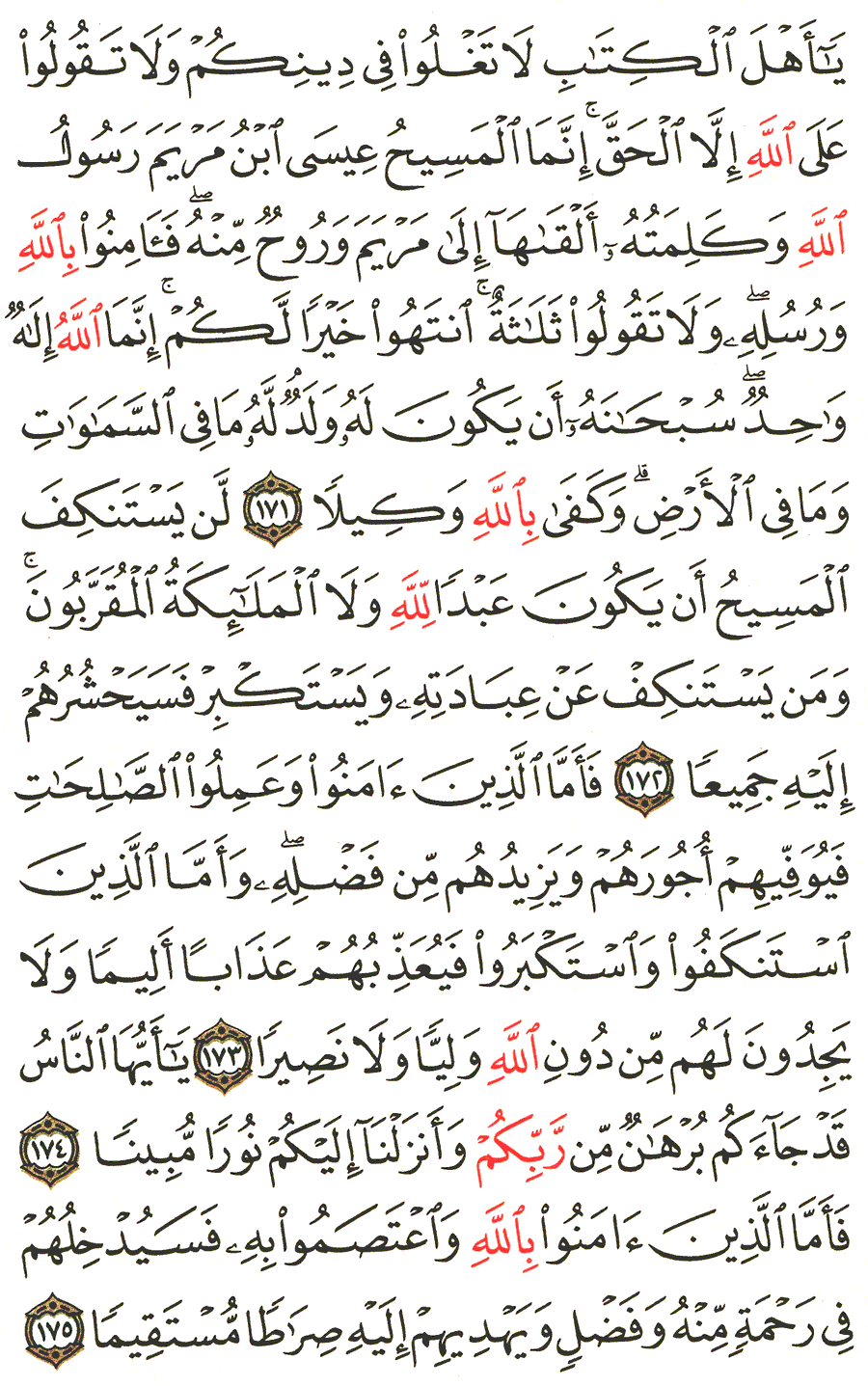Surah An-Nisa | from the moshaf in arabic uthmani
| Listen mp3 | Tafsir Arabic | tafsir mokhtasar |
| English | Indonesian | French |
| German | Hausa | Spanish |

English translation of the meaning Page No 105
Sura Al-Nisa from 171 to 175
171. O people of the Scripture ( Christians ) ! Do not exceed the limits in your religion, nor say of Allâh aught but the truth. The Messiah ‘Îsâ ( Jesus ) , son of Maryam ( Mary ) , was ( no more than ) a Messenger of Allâh and His Word, ( « Be! » - and he was ) which He bestowed on Maryam ( Mary ) and a spirit ( Rûh ) [ 1 ] created by Him; so believe in Allâh and His Messengers. Say not: « Three ( trinity ) ! » Cease! ( it is ) better for you. For Allâh is ( the only ) One Ilâh ( God ) , glory be to Him ( Far Exalted is He ) above having a son. To Him belongs all that is in the heavens and all that is in the earth. And Allâh is All- Sufficient as a Disposer of affairs. [ 2 ]
172. The Messiah will never be proud to reject to be a slave to Allâh, nor the angels who are the near ( to Allâh ) . And whosoever rejects His worship and is proud, then He will gather them all together unto Himself.
173. So, as for those who believed ( in the Oneness of Allâh - Islâmic Monotheism ) and did deeds of righteousness, He will give them their ( due ) rewards - and more out of His Bounty. But as for those who refused His worship and were proud, He will punish them with a painful torment. And they will not find for themselves besides Allâh any protector or helper.
174. O mankind! Verily, there has come to you a convincing proof ( Prophet Muhammad ( saas ) ) from your Lord; and We sent down to you a manifest light ( this Qur’ân ) .
175. So, as for those who believed in Allâh and held fast to Him, He will admit them to His Mercy and Grace ( i.e. Paradise ) , and guide them to Himself by the Straight Path.
[1] (V.4:171) Rûh-ullâh: According to the early religious scholars from among the Companions of the Prophet (saas) and their students and the Mujtahidûn , there is a rule to distinguish between the two nouns in the genitive construction:
a ) When one of the two nouns is Allâh, and the other is a person or a thing, e.g. Allâh’s House ( Bait- ullâh ) ; Allâh’s Messenger ( Rasul- ullâh ) : Allâh’s slave ( ‘Abdullâh ) : Allâh’s spirit ( Rûh- ullâh ) , the rule for the above words is that the second noun, e.g., house, messenger, slave, spirit is created by Allâh and is honourable in His Sight, and similarly, Allâh’s spirit may be understood as the spirit of Allâh, in fact it is a soul created by Allâh, i.e. ‘Îsâ ( Jesus ) . And it was His Word: « Be! » - and he was. [ i.e. ‘Îsâ ( Jesus ) was created like Adam ] .
b ) But when one of the two is Allâh and the second is neither a person nor a thing, then it is not a created thing but is a quality of Allâh e.g. Allâh’s Knowledge ( ‘Ilm- ullâh ) ; Allâh’s Life ( Hayât- ullâh ) ; Allâh’s Statement ( Kalâm- ullâh ) ; Allâh’s Self ( Dhat- ullâh ) .
[2] (V.4:171) Narrated ‘Ubadah (raa) : The Prophet (saas) said, "If anyone testifies that lâ ilâha illallâh (none has the right to be worshipped but Allâh Alone) Who has no partners, and that Muhammad (saas) is His slave and His Messenger, and that Jesus (as) is Allâh’s slave and His Messenger and His Word ("Be!" - and he was) which He bestowed on Mary and a spirit (Rûh) created by Him, and that Paradise is the truth, and Hell is the truth - Allâh will admit him into Paradise with the deeds which he had done even if those deeds were few." (Junadah, the subnarrator said; "Ubâdah added: ‘Such a person can enter Paradise through any of its eight gates he likes.’ ") (Sahih Al Bukhârî, Vol. 4, Hadîth No. 644).










Page No 105 Download and Listen mp3